Sur-vinyl of the fittest: Rough Trade is here, can the little guys compete?
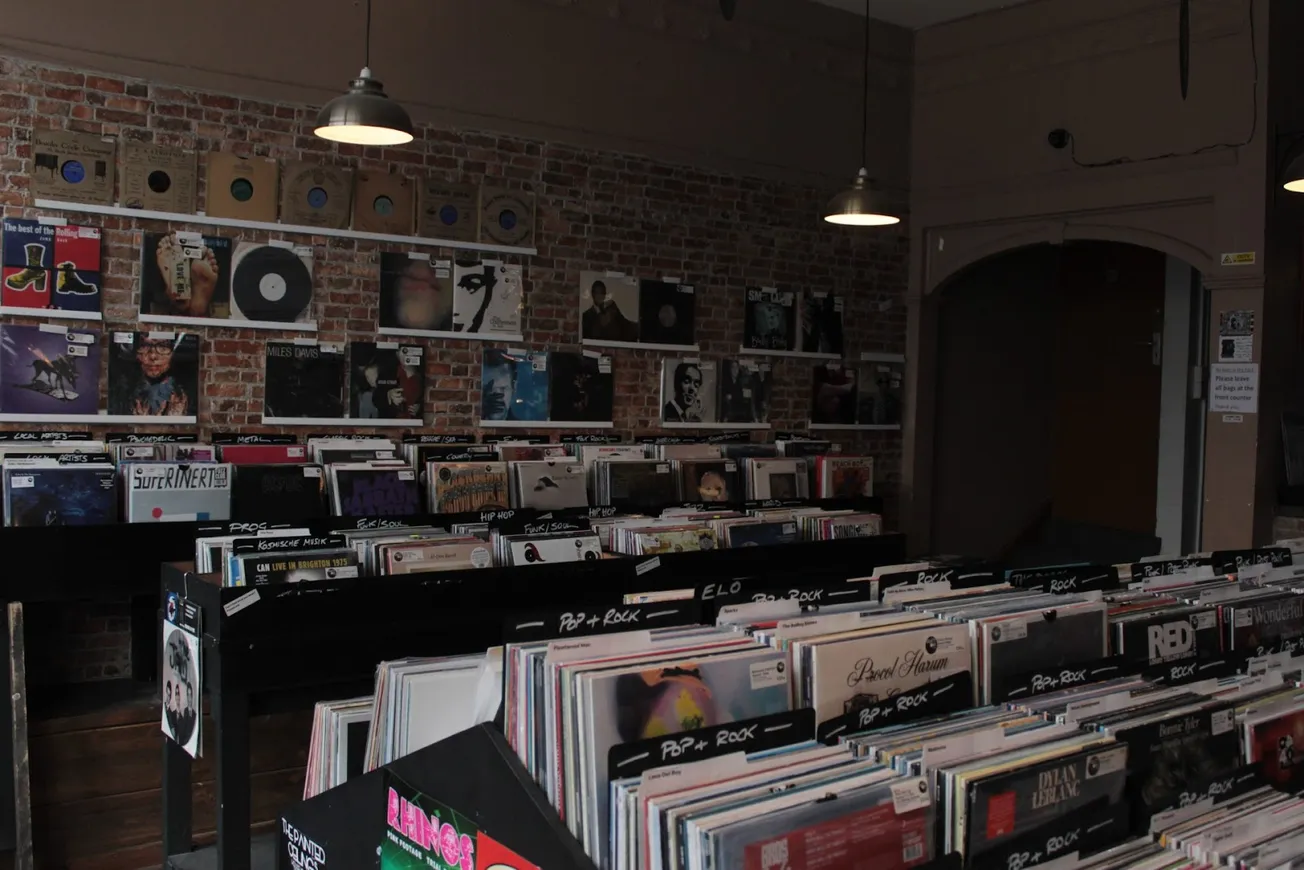
The biggest record store in the country has landed in Liverpool. But not everyone is thrilled
“They’re gonna put a lot of us out of business, so they can fuck off.”
I’m in a small, city-centre record shop which I will not name, and I’m pretending to look through the LPs. Well, I’m not exactly pretending, I’ve actually spotted a very tempting copy of a Pere Ubu album I’ve been after for a while. Still, I’m not here to buy records, I’m here to find out what the arrival of a brand new Rough Trade record shop, the biggest in the country, might have in store for the Liverpudlian music scene.
Unfortunately, an unbreakable code of omerta, collectively adhered to by the record shop owners of Liverpool, stands in my way. So far I’ve been to Jacaranda, Dig Records, 81 Renshaw, and Probe. The responses I’ve been receiving from the owners certainly indicate that they aren’t best pleased about the new arrival, but that they don’t want to talk about it on record (excuse the pun). Well, a few of them actually do want to talk about it, but they’re far too busy at the moment, what with Record Store Day coming up. The owner of this particular unnamed shop that I’m in at the moment is part of the former camp.
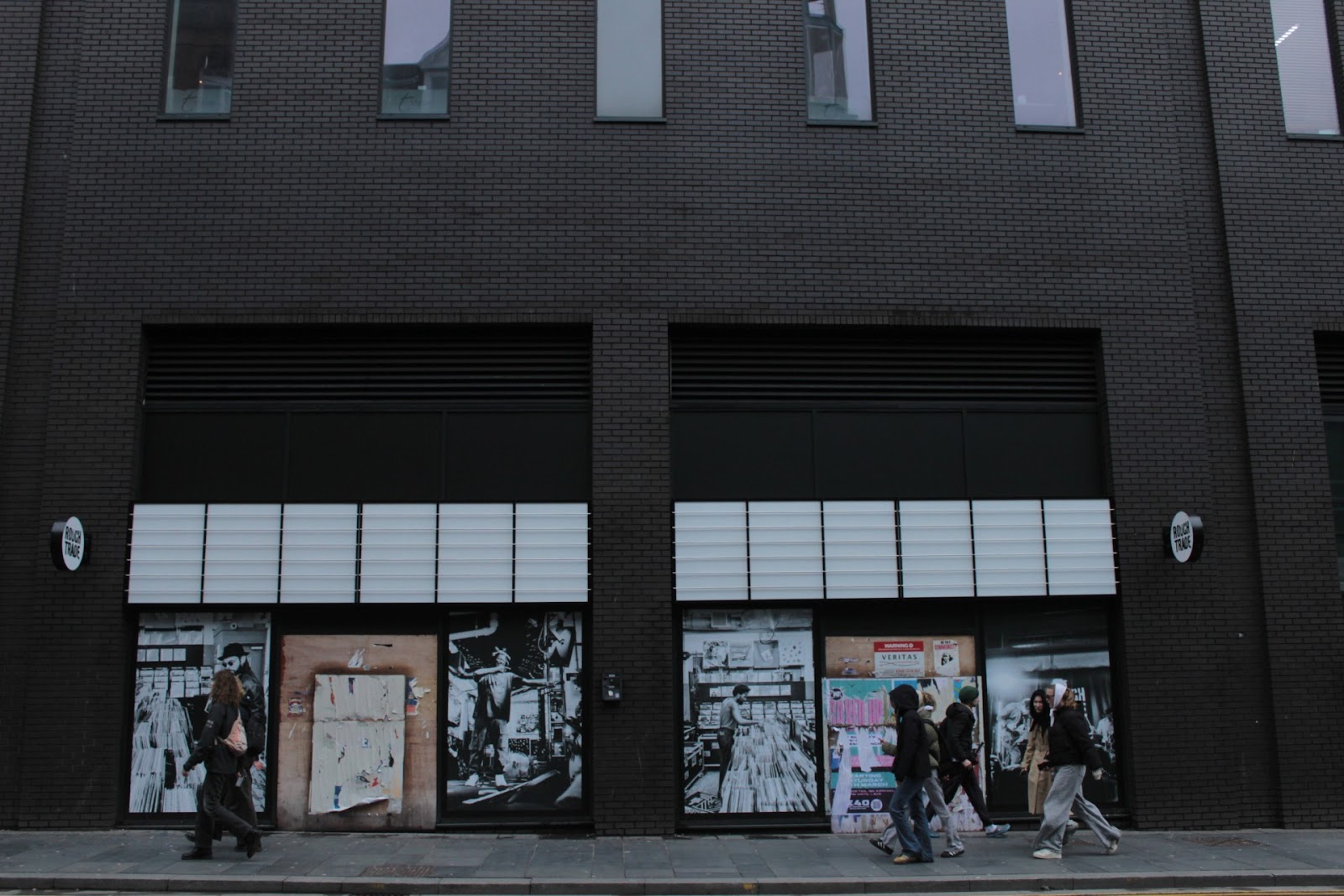
Rough Trade Liverpool opened their doors, or rather the doors to their first floor only, on the 18th of this month, exactly two days before International Record Store Day. The chain, which puts a significant amount of emphasis on its status as an independent business, already has three shops in London, as well as one in Bristol, Nottingham, not to mention the one in New York, and opened another in Berlin on the same day as its Liverpool branch. The new Rough Trade will not only function as a record shop, but also as a bar, cafe, and performance space. DJ Don Letts once said in an interview with the Guardian: “If music is my religion, Rough Trade is my church”. In that case, the Rough Trade of Hanover Street is the record store equivalent of the Liverpool Cathedral, in and of the fact that it’s the largest of its kind in the UK, it’s in Liverpool, and it’s likely more of an attraction than a place of genuine devotion.
All of this is not to sound bitter about Liverpool’s latest musical arrival, although I am admittedly, instinctively and perhaps reactionarily bitter about it. I grew up in Glasgow, and until I left the city at the age of 17, having no money for records, I bought CDs exclusively from the Love Music shop near Queen Street Station (where the fella on the till would entertain me with various stories involving selling smack to Nico) and the Oxfam Music on Byres Road (where a school friend of mine regularly volunteered). More due to finances than ethics, I bought exclusively second hand.
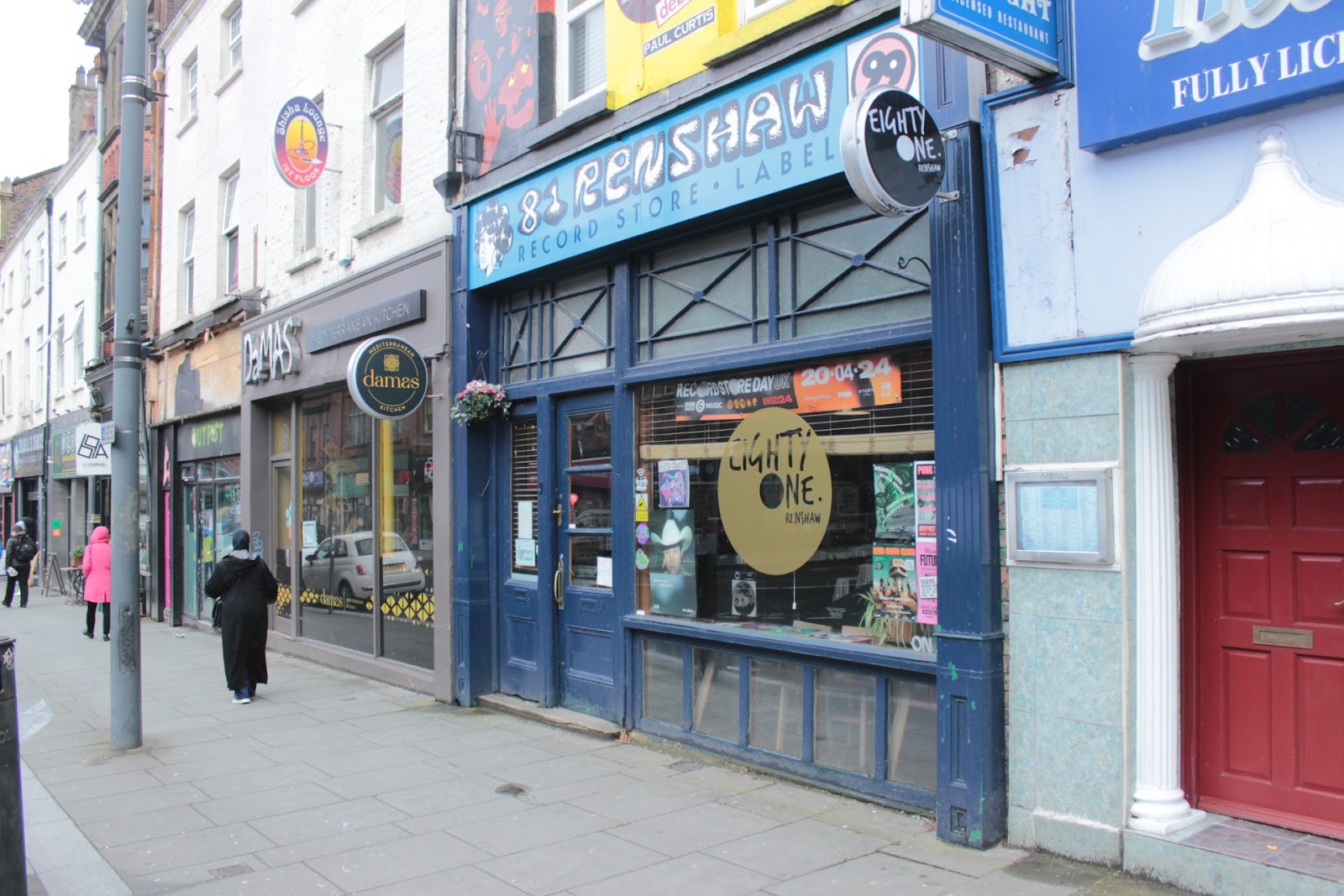
The three-storey HMV on Buchanan Street was the sworn enemy. Even the Fopp on Byres Road, just a few doors down and across the street from the Oxfam, was the enemy. I wouldn’t be seen dead in either. These things are tribal. Nowadays that HMV is a New Look, and that Fopp is a ‘Six by Nico’ (different Nico — more into chicken liver parfait than smack) with a six-course tasting menu. The music scene in Glasgow is only the worse for it, and my righteous boycotts were probably for nothing. More importantly perhaps, Love Music and the Oxfam still exist, and are thriving, in spite of it all.
This is not necessarily shocking. Generally speaking, record shop sales have been on the rise recently. Vinyl sales have risen for 16 consecutive years, and in 2023 reached their highest annual level since 1990. International Record Store day has played no small part in this, having increased annual vinyl sales by 122%. #VinylRevival has been trending on and off on various social media outlets for a good few years now. At a surface glance, record shops are doing better than they ever have in the last two decades, and the addition of a Rough Trade to Liverpool’s record shop scene only serves to provide healthy competition, increase choice and selection for consumers, provide jobs for locals that pay the national living wage, and promote local musicians through their event space and their adjacent (if technically unrelated) label, Rough Trade Records.
But at a closer glance, record shop owners are quite clearly and quite reasonably concerned about the prospect of being put out of business. Rough Trade is a big chain. They might wear the patina of a friendly neighbourhood record store, but this is a brand with a nose for ruthless business practice.
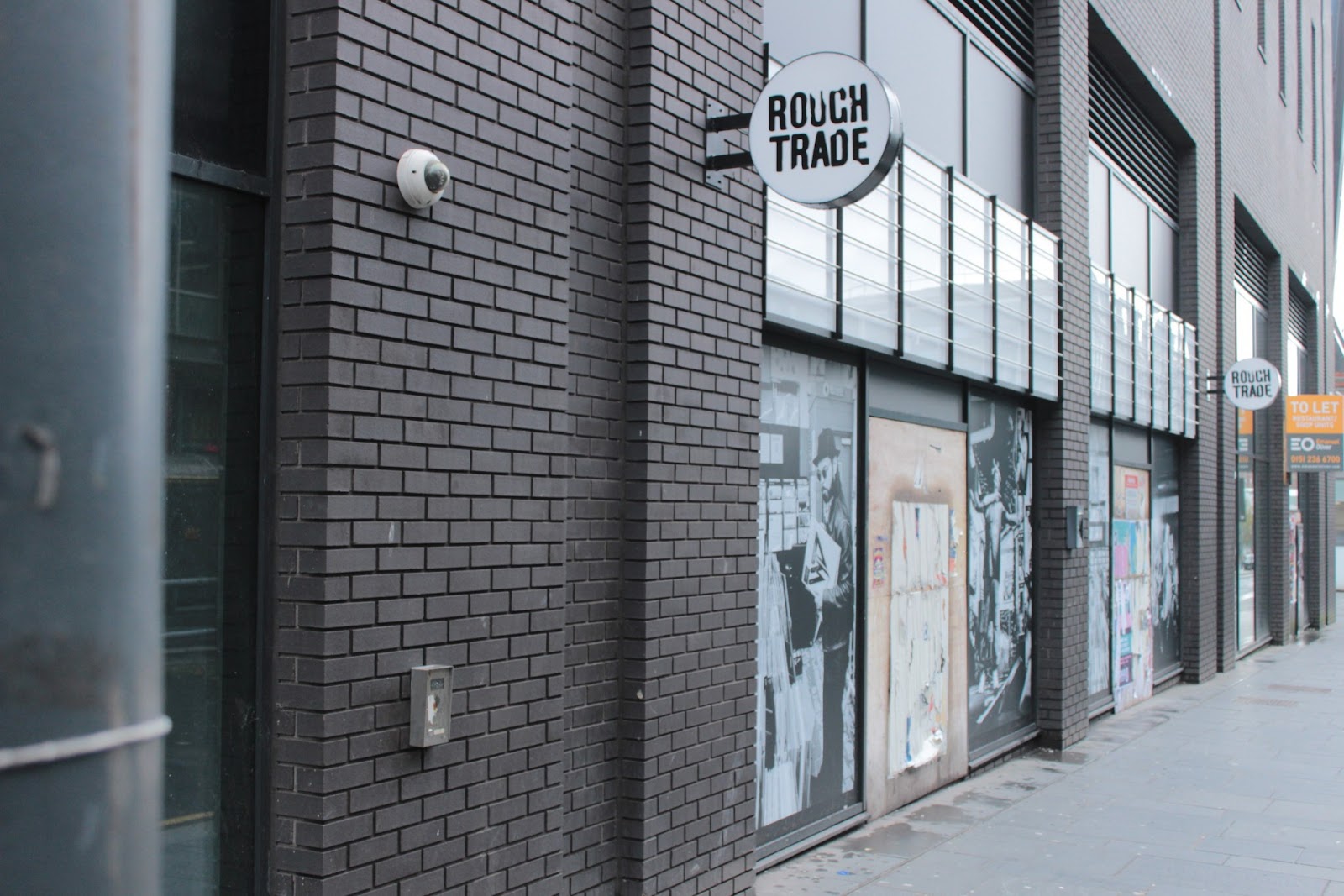
Take Record Store Day as an example. As a large chain, Rough Trade are in a better position to negotiate exclusive editions of new records — this year, a new, pink version of Olivia Rodrigo’s latest seven-inch, and a limited edition, 30th anniversary reissue of Parklife, to name a couple. These are typically only a couple of quid more expensive than the standard record, or even the same price as the standard in other, smaller shops. Such exclusives are enough to tempt even the most loyal of vinyl collectors and small-shop-shoppers. Rough Trade are able to acquire these limited edition records, fair and square, by being a large(ish) chain and at times by having an affiliated label, but that doesn’t stop them being a threat to smaller businesses.
Furthermore, when they opened their Nottingham shop in 2014, Rough Trade were able to wangle a tidy five-year exemption of business rates from the council (worth more than £28,000 a year), as Nottingham City Council wanted to persuade them against opening in Manchester instead. A council email, later quoted by music magazine The Quietus, stated that it was “clear that a rates incentive package is something that would make all the difference in bringing them to Nottingham.” Meanwhile, and down the same Nottingham road, The Music Exchange, a not-for-profit record shop, went out of business just 18 months after the Rough Trade opened. It can’t be said for certain these were related — the Music Exchange had struggled even before Rough Trade arrived on the scene — but to the little-shop-loyalists, the incident left a sour taste. The Music Exchange had been Rough-ed up, so to speak.
One person who is willing to speak openly on the matter of the Liverpool Rough Trade is Barry Sutton, a born-and-bred Scouser who has been active in the local music scene for almost 40 years, and has always been a loyal customer to Probe Records — a small, independent record shop in Bluecoat Chambers. “[Probe] was a hub for all the weirdos and freaks in Liverpool when I was a teenager in the early 80s,” Barry informs me over WhatsApp. “Buying vinyl in that shop was a rite of passage.”
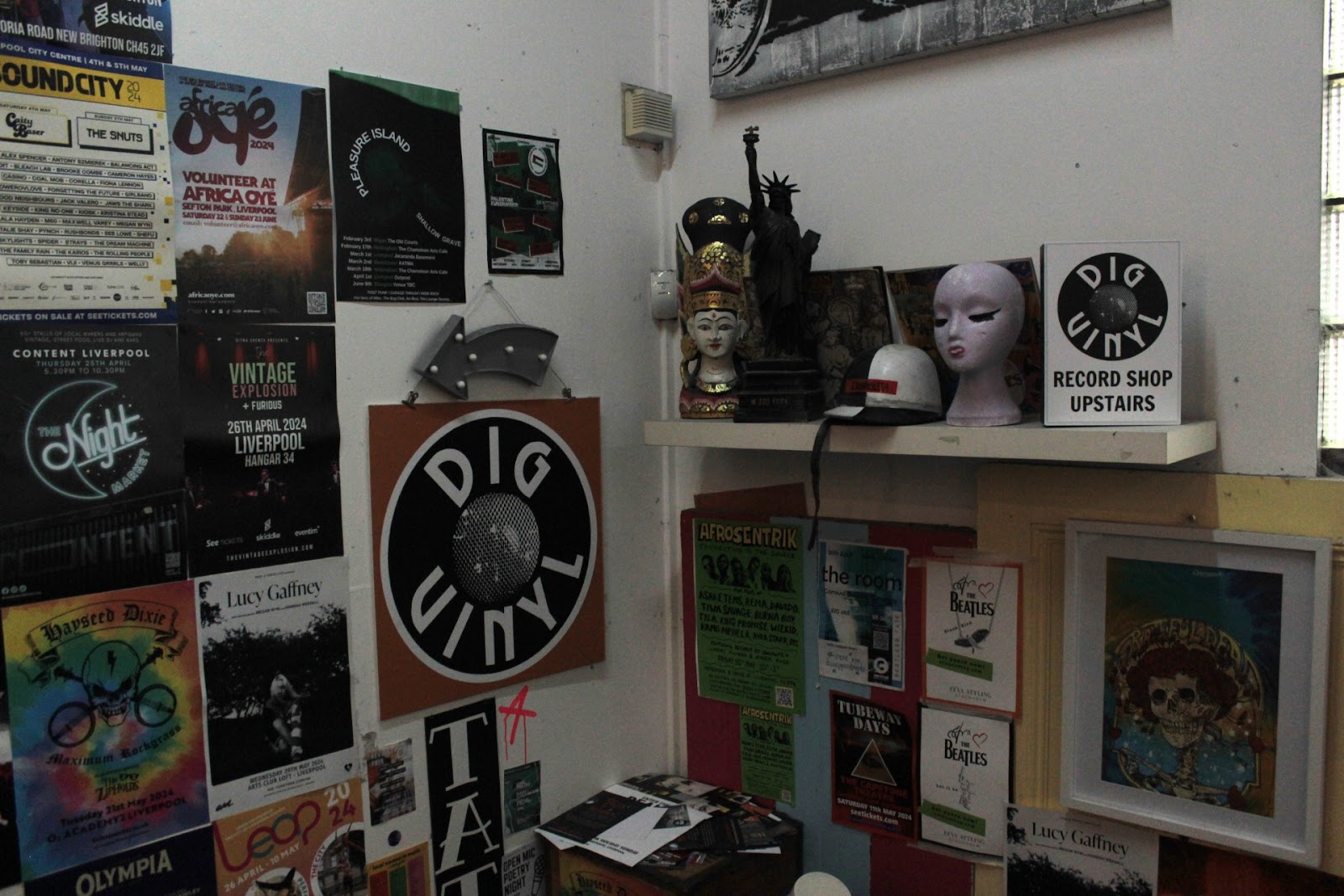
Probe records first opened on Clarence Street in 1971, and has since then moved about Liverpool to various locations, before settling into its current home in 2010. The shop’s founder, Geoff Davies, also started the record label Probe Plus exactly a decade after opening the store, which promoted small, unsigned, and mostly Merseyside-adjacent bands, though Davies described the label as promoting “music to drive you to drink.”
Barry tells me that he began his relationship with Probe as a self-proclaimed “nervous customer” (little wonder — after Davies’ death last year, author Frank Cottrell-Boyce wrote that “everyone had a story about Geoff chasing them out of the shop for asking for the wrong kind of record”), but went on to work a brief stint behind the till in 1986, joining an all-star list of Probe Till Alumni that includes Pete Wylie, Courtney Love, Julian Cope, and Dead or Alive frontman Pete Burns, among others. Later, his relationship with the business expanded to the record label, when he played in the band Walkingseeds, who released an EP with Probe Plus. The label went on to famously launch and sustain the career of Birkenhead legends Half Man Half Biscuit. “I’ve lost track of the huge amount of wonderful underground bands I discovered through Probe,” Barry informs me. “Many of my peers feel the same.”
So what does the arrival of a chain shop like Rough Trade actually mean for a longstanding cultural institution like Probe? “Ideally, I would hope that the Liverpool music economy can sustain both outlets,” suggests Barry. “But Rough Trade has the clout of a chain. My worry is that it will impact shops serving a similar demographic, the areas covered are too similar. Probe might suffer materially — even close.” Still, it seems fair to speculate that existing shops, and especially those like Probe that are so entrenched in Liverpool’s music culture, have a loyal customer base that will continue to support them regardless of multistorey shops from London selling pink vinyl exclusives. Barry seems to agree — he certainly won’t be jumping ship anytime soon. “I’ve always liked Rough Trade as a label, but it’s a chain. My loyalties clearly are to Probe. They have a devoted customer base, and I hope that’ll allow them to stay strong in the face of a changing market.”
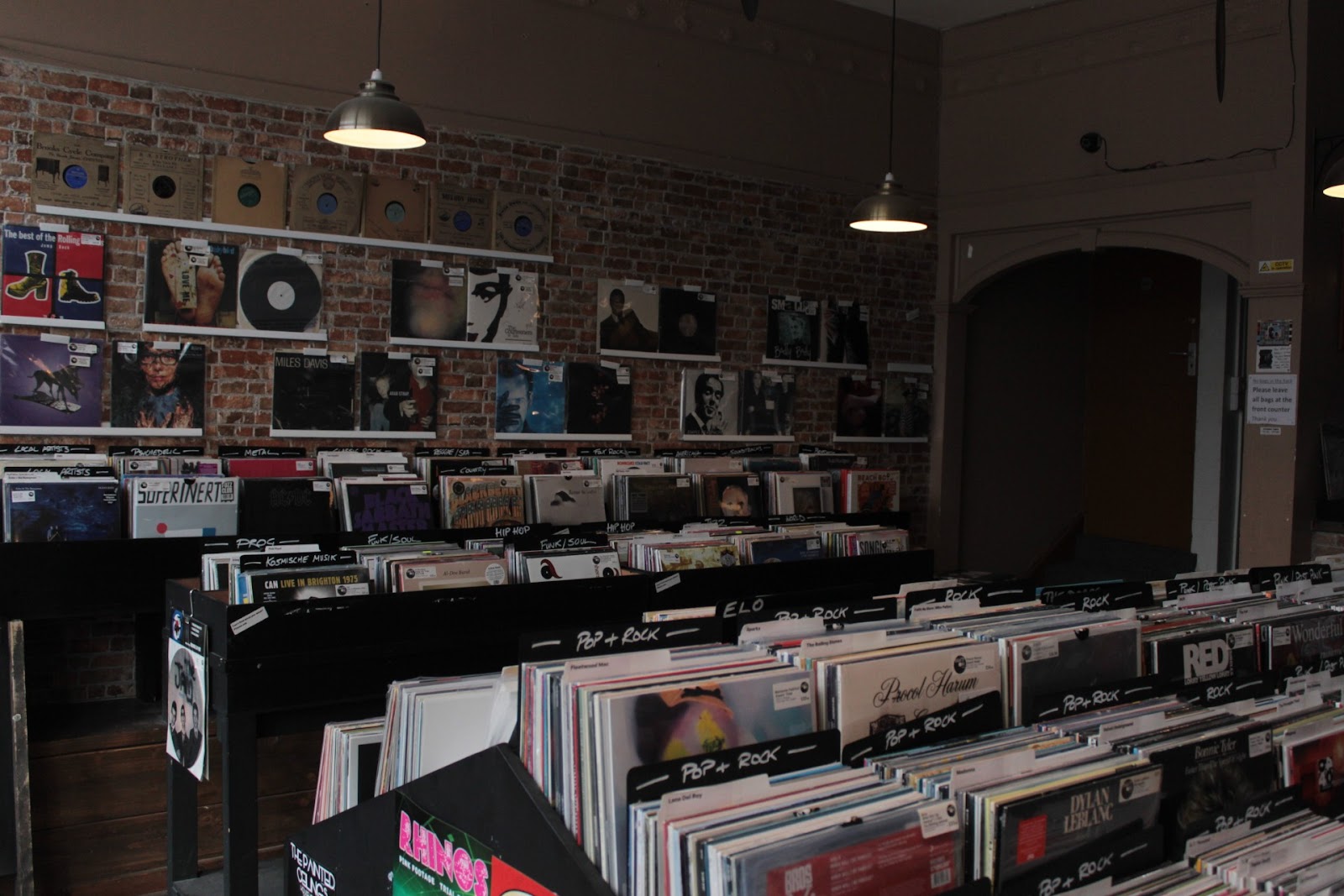
It’s also only fair to point out that Rough Trade aren’t the only record shop in Liverpool tempting customers with gimmicky exclusives this Record Store Day. The vast majority of them will be providing a selection of RSD limited edition vinyls. 81 Renshaw is selling a blue vinyl re-release of an astro-sounds album by 101 Strings, which even I — to this day a collector of second-hand vinyl only — must admit to being a little bit tempted by. Jacaranda Records are hosting a competition to win a number of limited edition Record Store Day slipmats. This is just how Record Store Day goes, and it’s the reason the event has so successfully boosted vinyl sales. The only difference is that Rough Trade is connected to its very own and rather large record label (though the label has operated as its own separate company since the 80s), some of the releases from which are available only at Rough Trade stores, so they’re able to offer their own extra-exclusive exclusives, as well as the regular RSD exclusives available at the other shops.
This is the main advantage, aside from the occasional dabbling in the world of rate-reduction. Rough Trade has an affiliated record label. Rough Trade has a performance space (so does Jacaranda, mind, though it’s little wonder they haven’t put anyone out of business). While these things may potentially be a threat to Liverpool’s existing shops, they’re probably really quite good for Liverpool’s young musicians, and at least for now, at least superficially, Rough Trade do seem to want to use their label, stage, and clout, to promote local talent.
One young Liverpool local I spoke to who went for a job interview at the shop (and has asked not to be named lest they get the gig) described how a big portion of the group interview was spent discussing local acts that the shop should keep their eyes and ears out for, and asking the interviewees how they think the shop could best assimilate with local customers, record shops, and the local music scene. Ignoring the fact that this is effectively unpaid market research, it’s reassuring to hear that Rough Trade is eager to become a valuable part of the music scene, and in many ways, the arrival of the shop is further testament to the fact that Liverpool’s record shop industry is alive and thriving. Even Barry seems reassured. “Probe is no longer active as a label,” he informs me, “so if Rough Trade can break interesting Liverpool bands and allow them live exposure, then I’m all for it.”
Photographs by Olive Payne

Comments
Latest
Trust in vaccines has fallen post-COVID. Now Knowsley has a measles outbreak
A Liverpool developer became a Dubai crypto kingpin. Now he’s accused of defrauding investors out of $400 million
Is Liverpool on track for net zero by 2030?
Just what is a “public space” in Liverpool?
Sur-vinyl of the fittest: Rough Trade is here, can the little guys compete?
The biggest record store in the country has landed in Liverpool. But not everyone is thrilled